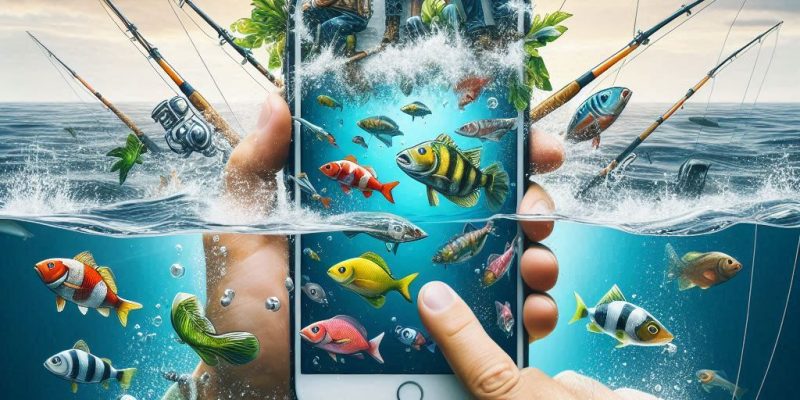The Rise of Fishing Apps in Modern Angling
Fishing apps have revolutionized the way anglers approach their sport. Gone are the days of relying solely on local knowledge and intuition. Now, with a tap or two, you can access real-time weather data, locate potential fishing hot spots based on user reports, and even analyze underwater structures with sophisticated sonar integrations.

The Debate Around Fishing Apps
Arguments Against Fishing Apps
Some argue that fishing apps are hurting the recreational fishing industry by:
- Increasing Fishing Pressure: With everyone armed with the same information, popular spots become overcrowded, leading to overfishing and depleted stocks.
- “Spot Burning”: Anglers can pinpoint the exact location of successful catches, potentially ruining hidden gems for others who rely on traditional methods.
- Homogenizing the Experience: The reliance on apps can take the thrill of discovery and self-reliance out of fishing, making it less about the challenge and more about the catch.
The Convenience of Fishing Apps
Fishing apps have undeniably made life easier for many anglers. They offer features like weather forecasts, tide charts, fish identification, and even social networking for fishers to share their catches.
These apps can enhance the fishing experience by providing valuable information that might be difficult to obtain otherwise.
Accessibility for All Anglers
From beginners to seasoned anglers, fishing apps like FishVerify allow quick identification of a species to enable catch and release when out of season or fail to meet bag or size limits.
Apps also enable better planning, increase the chances of a successful outing, and foster a sense of community among fishers.
Key Advantages of Fishing Apps
- Sustainability Tools: Many apps allow users to report catch data, which can be valuable for fisheries management and conservation efforts.
- Democratization of Knowledge: Previously guarded knowledge is now accessible to all, leveling the playing field for new anglers and promoting inclusivity.
- Enhanced Efficiency: Apps can help anglers locate productive areas and target specific species, leading to more successful fishing trips and potentially reducing overall fishing pressure.
The Role of Sonar Technologies

The debate around sonar technology further complicates the issue. Advanced sonar systems can provide detailed underwater images, revealing fish locations and underwater structures with pinpoint accuracy. While some view this as an unfair advantage, others see it as simply another tool in the angler’s arsenal, no different from using high-quality fishing rods or lures.
The Industry Perspective
The recreational fishing industry itself has mixed feelings about these advancements.
Economic ramifications also warrant consideration. Traditional bait and tackle shops, which have been integral to the fishing community, might suffer as anglers increasingly rely on apps for gear recommendations and purchases. However, there’s an opposing view that these technologies might actually draw more people into the sport, potentially increasing overall spending within the industry.
Supporters within the industry believe that fishing apps and sonar technologies can attract new participants, especially younger generations who are tech-savvy and might otherwise not be interested in fishing. This influx can boost sales for fishing gear, boats, and related services.
The Safety Benefits of Digital Guides and Forecasts
One of the most significant advantages of fishing apps is the ability to have digital guides that compile crucial information such as local rules, regulations, and weather forecasts. This not only enhances the fishing experience but also ensures the safety of anglers when out on the water.
By providing up-to-date regulations, these apps help anglers adhere to legal fishing limits and practices, promoting sustainable fishing and conservation efforts.
Detailed weather forecasts and alerts allow fishers to plan their trips around optimal weather conditions, reducing the risk of encountering hazardous conditions.
Consequently, fishing apps serve as invaluable resources for both maintaining legal compliance and enhancing on-the-water safety for all anglers.
On the contrary, some industry veterans express concern that the over-reliance on technology might undermine the traditional values of the sport. There’s also the environmental aspect: increased pressure on fish populations could lead to stricter regulations and closures, which might negatively impact the industry in the long run.
Finding the Balance: Responsible App Use and Sustainable Fishing Practices
So, are fishing apps a threat to the recreational fishing industry? The answer likely lies somewhere in between. Used responsibly, these apps can be powerful tools for learning, conservation, and efficient fishing. Here are some key points to consider:
- Focus on Skill Development: Apps should complement, not replace, the development of essential fishing skills like reading water conditions, identifying fish species, and using traditional fishing techniques.
- Prioritize Sustainable Practices: Anglers should prioritize catch-and-release for certain species, respect size limits, and be mindful of their overall catch to minimize pressure on fish stocks.
- Embrace the Challenge: The thrill of the hunt and the satisfaction of catching a fish through knowledge and skill shouldn’t be lost in the digital age.
Ultimately, the responsibility lies with the angler. By using fishing apps responsibly, prioritizing ethical fishing practices, and respecting the delicate balance of our marine ecosystems, we can ensure a sustainable future for the recreational fishing industry and the fish we love to catch.


